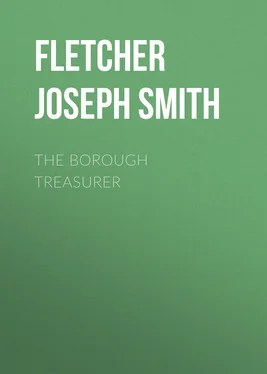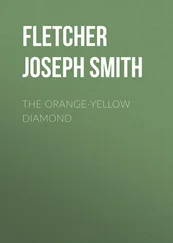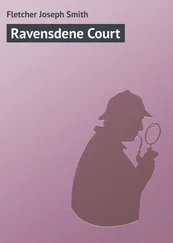Joseph Fletcher - The Borough Treasurer
Здесь есть возможность читать онлайн «Joseph Fletcher - The Borough Treasurer» — ознакомительный отрывок электронной книги совершенно бесплатно, а после прочтения отрывка купить полную версию. В некоторых случаях можно слушать аудио, скачать через торрент в формате fb2 и присутствует краткое содержание. Жанр: foreign_prose, Классический детектив, foreign_detective, foreign_antique, на английском языке. Описание произведения, (предисловие) а так же отзывы посетителей доступны на портале библиотеки ЛибКат.
- Название:The Borough Treasurer
- Автор:
- Жанр:
- Год:неизвестен
- ISBN:нет данных
- Рейтинг книги:5 / 5. Голосов: 1
-
Избранное:Добавить в избранное
- Отзывы:
-
Ваша оценка:
- 100
- 1
- 2
- 3
- 4
- 5
The Borough Treasurer: краткое содержание, описание и аннотация
Предлагаем к чтению аннотацию, описание, краткое содержание или предисловие (зависит от того, что написал сам автор книги «The Borough Treasurer»). Если вы не нашли необходимую информацию о книге — напишите в комментариях, мы постараемся отыскать её.
The Borough Treasurer — читать онлайн ознакомительный отрывок
Ниже представлен текст книги, разбитый по страницам. Система сохранения места последней прочитанной страницы, позволяет с удобством читать онлайн бесплатно книгу «The Borough Treasurer», без необходимости каждый раз заново искать на чём Вы остановились. Поставьте закладку, и сможете в любой момент перейти на страницу, на которой закончили чтение.
Интервал:
Закладка:
J. S. Fletcher
The Borough Treasurer
CHAPTER I
BLACKMAIL
Half way along the north side of the main street of Highmarket an ancient stone gateway, imposing enough to suggest that it was originally the entrance to some castellated mansion or manor house, gave access to a square yard, flanked about by equally ancient buildings. What those buildings had been used for in other days was not obvious to the casual and careless observer, but to the least observant their present use was obvious enough. Here were piles of timber from Norway; there were stacks of slate from Wales; here was marble from Aberdeen, and there cement from Portland: the old chambers of the grey buildings were filled to overflowing with all the things that go towards making a house—ironwork, zinc, lead, tiles, great coils of piping, stores of domestic appliances. And on a shining brass plate, set into the wall, just within the gateway, were deeply engraven the words: Mallalieu and Cotherstone, Builders and Contractors .
Whoever had walked into Mallalieu & Cotherstone's yard one October afternoon a few years ago would have seen Mallalieu and Cotherstone in person. The two partners had come out of their office and gone down the yard to inspect half a dozen new carts, just finished, and now drawn up in all the glory of fresh paint. Mallalieu had designed those carts himself, and he was now pointing out their advantages to Cotherstone, who was more concerned with the book-keeping and letter-writing side of the business than with its actual work. He was a big, fleshy man, Mallalieu, midway between fifty and sixty, of a large, solemn, well-satisfied countenance, small, sly eyes, and an expression of steady watchfulness; his attire was always of the eminently respectable sort, his linen fresh and glossy; the thick gold chain across his ample front, and the silk hat which he invariably wore, gave him an unmistakable air of prosperity. He stood now, the silk hat cocked a little to one side, one hand under the tail of his broadcloth coat, a pudgy finger of the other pointing to some new feature of the mechanism of the new carts, and he looked the personification of self-satisfaction and smug content.
"All done in one action, d'ye see, Cotherstone?" he was saying. "One pull at that pin releases the entire load. We'd really ought to have a patent for that idea."
Cotherstone went nearer the cart which they were examining. He was a good deal of a contrast to his partner—a slightly built, wiry man, nervous and quick of movement; although he was Mallalieu's junior he looked older, and the thin hair at his temples was already whitening. Mallalieu suggested solidity and almost bovine sleekness; in Cotherstone, activity of speech and gesture was marked well-nigh to an appearance of habitual anxiety. He stepped about the cart with the quick action of an inquisitive bird or animal examining something which it has never seen before.
"Yes, yes, yes!" he answered. "Yes, that's a good idea. But if it's to be patented, you know, we ought to see to it at once, before these carts go into use."
"Why, there's nobody in Highmarket like to rob us," observed Mallalieu, good-humouredly. "You might consider about getting—what do they call it?—provisional protection?—for it."
"I'll look it up," responded Cotherstone. "It's worth that, anyhow."
"Do," said Mallalieu. He pulled out the big gold watch which hung from the end of his cable chain and glanced at its jewelled dial. "Dear me!" he exclaimed. "Four o'clock—I've a meeting in the Mayor's parlour at ten past. But I'll look in again before going home."
He hurried away towards the entrance gate, and Cotherstone, after ruminative inspection of the new carts, glanced at some papers in his hand and went over to a consignment of goods which required checking. He was carefully ticking them off on a list when a clerk came down the yard.
"Mr. Kitely called to pay his rent, sir," he announced. "He asked to see you yourself."
"Twenty-five—six—seven," counted Cotherstone. "Take him into the private office, Stoner," he answered. "I'll be there in a minute."
He continued his checking until it was finished, entered the figures on his list, and went briskly back to the counting-house near the gateway. There he bustled into a room kept sacred to himself and Mallalieu, with a cheery greeting to his visitor—an elderly man who had recently rented from him a small house on the outskirts of the town.
"Afternoon, Mr. Kitely," he said. "Glad to see you, sir—always glad to see anybody with a bit of money, eh? Take a chair, sir—I hope you're satisfied with the little place, Mr. Kitely?"
The visitor took the offered elbow-chair, folded his hands on the top of his old-fashioned walking-cane, and glanced at his landlord with a half-humorous, half-quizzical expression. He was an elderly, clean-shaven, grey-haired man, spare of figure, dressed in rusty black; a wisp of white neckcloth at his throat gave him something of a clerical appearance: Cotherstone, who knew next to nothing about him, except that he was able to pay his rent and taxes, had already set him down as a retired verger of some cathedral.
"I should think you and Mr. Mallalieu are in no need of a bit of money, Mr. Cotherstone," he said quietly. "Business seems to be good with you, sir."
"Oh, so-so," replied Cotherstone, off-handedly. "Naught to complain of, of course. I'll give you a receipt, Mr. Kitely," he went on, seating himself at his desk and taking up a book of forms. "Let's see—twenty-five pounds a year is six pound five a quarter—there you are, sir. Will you have a drop of whisky?"
Kitely laid a handful of gold and silver on the desk, took the receipt, and nodded his head, still watching Cotherstone with the same half-humorous expression.
"Thank you," he said. "I shouldn't mind."
He watched Cotherstone produce a decanter and glasses, watched him fetch fresh water from a filter in the corner of the room, watched him mix the drinks, and took his own with no more than a polite nod of thanks. And Cotherstone, murmuring an expression of good wishes, took a drink himself, and sat down with his desk-chair turned towards his visitor.
"Aught you'd like doing at the house, Mr. Kitely?" he asked.
"No," answered Kitely, "no, I can't say that there is."
There was something odd, almost taciturn, in his manner, and Cotherstone glanced at him a little wonderingly.
"And how do you like Highmarket, now you've had a spell of it?" he inquired. "Got settled down, I suppose, now?"
"It's all that I expected," replied Kitely. "Quiet—peaceful. How do you like it?"
"Me!" exclaimed Cotherstone, surprised. "Me?—why, I've had—yes, five-and-twenty years of it!"
Kitely took another sip from his glass and set it down. He gave Cotherstone a sharp look.
"Yes," he said, "yes—five-and-twenty years. You and your partner, both. Yes—it'll be just about thirty years since I first saw you. But—you've forgotten."
Cotherstone, who had been lounging forward, warming his hands at the fire, suddenly sat straight up in his chair. His face, always sharp seemed to grow sharper as he turned to his visitor with a questioning look.
"Since—what?" he demanded.
"Since I first saw you—and Mr. Mallalieu," replied Kitely. "As I say, you've forgotten. But—I haven't."
Cotherstone sat staring at his tenant for a full minute of speechlessness. Then he slowly rose, walked over to the door, looked at it to see that it was closed, and returning to the hearth, fixed his eyes on Kitely.
"What do you mean?" he asked.
"Just what I say," answered Kitely, with a dry laugh. "It's thirty years since I first saw you and Mallalieu. That's all."
"Where?" demanded Cotherstone.
Kitely motioned his landlord to sit down. And Cotherstone sat down—trembling. His arm shook when Kitely laid a hand on it.
Читать дальшеИнтервал:
Закладка:
Похожие книги на «The Borough Treasurer»
Представляем Вашему вниманию похожие книги на «The Borough Treasurer» списком для выбора. Мы отобрали схожую по названию и смыслу литературу в надежде предоставить читателям больше вариантов отыскать новые, интересные, ещё непрочитанные произведения.
Обсуждение, отзывы о книге «The Borough Treasurer» и просто собственные мнения читателей. Оставьте ваши комментарии, напишите, что Вы думаете о произведении, его смысле или главных героях. Укажите что конкретно понравилось, а что нет, и почему Вы так считаете.












